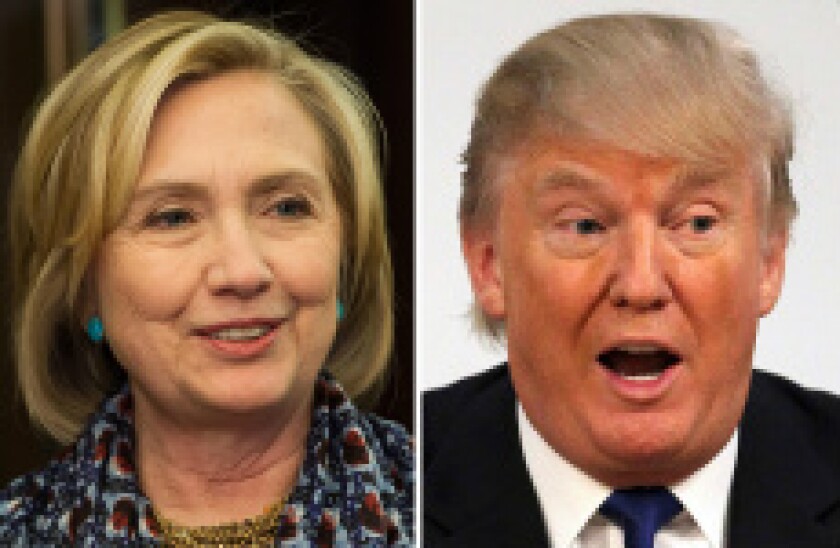A win for her rival Donald Trump, however, would probably lead to a rush to safe haven assets — although there is confidence that the market would regain stability before long, rather similar to the behaviour seen following the UK’s decision in June to leave the European Union.
Far more worrying, for some, is the prospect of a disputed result, which could lead to weeks of legal wrangling.
Given the “greater uncertainty” over Trump’s proposals on trade and fiscal policy, a victory for him would likely lead to a fall in US Treasury yields, said JP Morgan analysts in a note on Monday. That has been in evidence on poll moves over the last few weeks, with better numbers for Trump translating to a rush to safe haven assets.
The opposite has happened when events are moving in favour of Clinton. On Monday, 10 year US yields were up around 4bp on last Friday’s close, as investors moved away from safe haven assets following the FBI’s announcement.
A win for Clinton would lead to a rise in 10 year US Treasury yields from 1.79% by 3bp, JP Morgan said, while a Trump win would result in an 11bp fall.
“If Trump wins, Treasury yields would rally aggressively,” said a head of SSA DCM. “That’s a concern as we want higher yields.”
More pronounced would be the move in the eurozone periphery if the Republican candidate wins, according to JP Morgan’s estimates. While a Clinton victory would result in a 10bp narrowing in the 10 year spread between Italy and Germany — currently 1.59% — a Trump win would lead to a 25bp widening.
Raising questions
Some analysts also suggest that a Trump win would decrease the likelihood of the US Federal Reserve raising rates at its December meeting. CME Group’s FedWatch Tool, which tracks investor expectations of rate rises using Fed Fund futures prices, had a 66.8% expectation last Friday of a rate rise at the Fed’s next meeting in December, down from 71.5% a day earlier. That fall happened as Trump narrowed Clinton’s lead in the polls.
But since the FBI’s announcement over the weekend, the expectation of a December hike rose to 76.3% on Monday.
But even a Trump win would be unlikely to disturb markets long enough to affect conditions for public sector borrowers, said a head of SSA syndicate.
“We saw Brexit — which in my opinion was much more of a market mover than the US election — where the effect proved to be short lived,” he said. “The market was up and running again after a few days.
“If Clinton wins it’ll be business as usual the day after. If it’s Trump, we might have a bit of volatility for a few days, but I can’t see it shutting down markets until year end.”
Most SSA borrowers have completed nearly all their funding for the year, but some are still planning on issuing green bonds and other such instruments. Bank Nederlandse Gemeenten is holding investor calls for a debut dollar sustainability bond, for instance, while the European Stability Mechanism rounds off its funding needs for the year with an auction on Wednesday.
Inconclusive
Many market participants are less worried about who wins Tuesday’s election and are more concerned that a clear winner emerges.
While Clinton is ahead in most polls, the vote is close in many of the battleground states — those that often flip between Republican and Democrat at elections — potentially leading to the result ending up in several court battles, like what happened after the 2000 presidential election.
“Many assume that a Clinton victory will mean that we’re back to business but the outcome could be disputed, which would have serious consequences,” said an MTN dealer.
That sentiment echoed that of a head of funding at a European agency, who told GlobalCapital last week that an inconclusive result would be the “most dangerous thing about this election”, as it could lead to a lot of market volatility.
Several market participants have questioned the reliability of polls, especially since the Brexit vote in June, with some suggesting what is being dubbed the “anger vote” is difficult to factor in to election predictions.
But the SSA DCM head suggested that Brexit may not be the best indicator for the US election.
“I’m still assuming that Clinton will win,” he said. “The argument is that there’s a lot of people that won’t declare support for Trump to pollsters or in public, but will vote for him in private, similar to what happened with people on Brexit.
“But in the US, people are proud to be voting for him and vocal about it. I can’t believe there are many hiding away that aren’t saying they’ll vote for him. In the UK, people are more reserved.”







